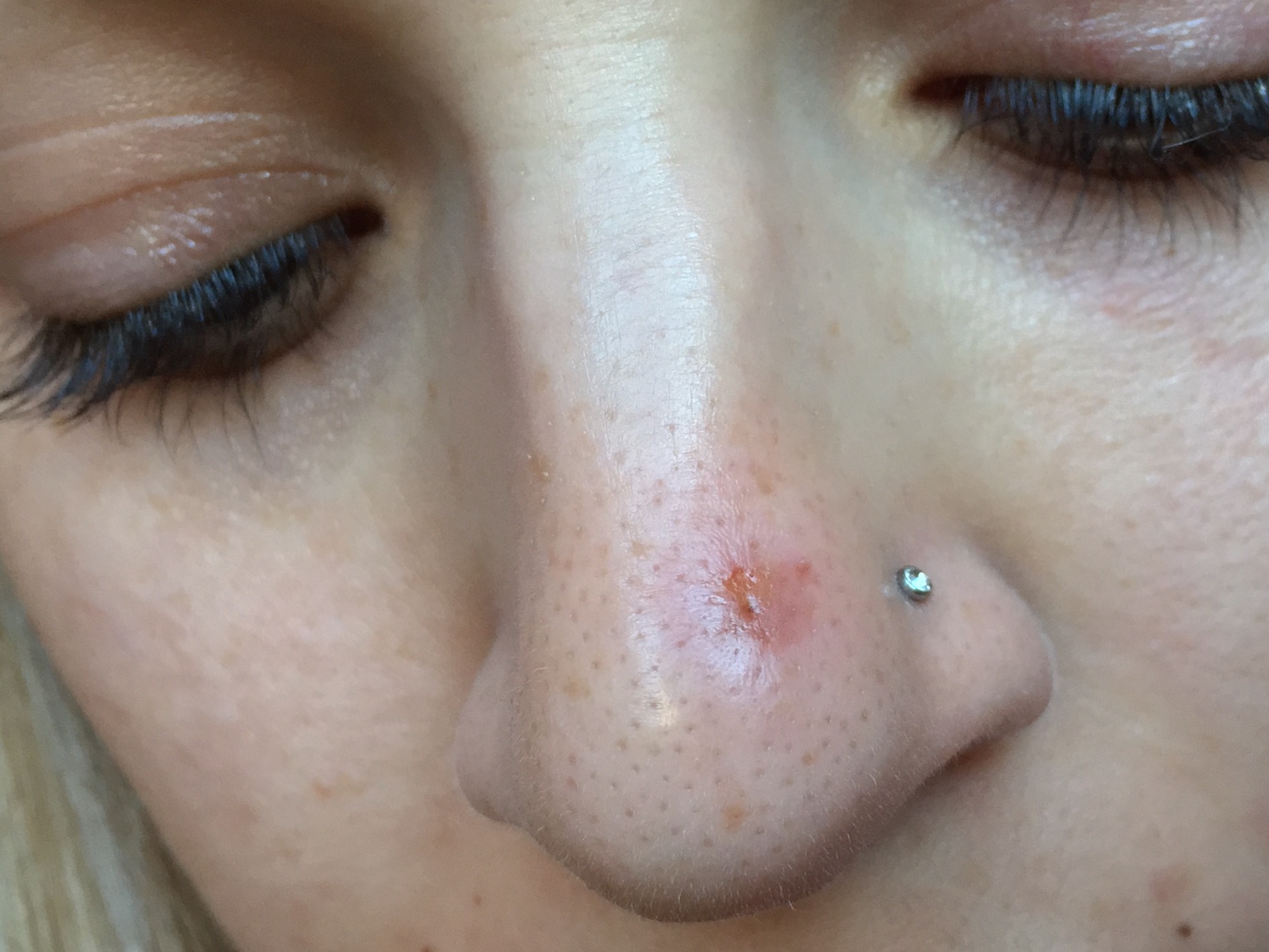Scar On Nose: A Comprehensive Guide To Understanding, Treating, And Embracing Your Unique Story
Ever wondered why that scar on your nose feels like it tells a story? Well, it does, and it’s one heck of a story too! Whether it’s from an accidental fall, a childhood mishap, or even surgery, scars on the nose are more than just marks—they’re symbols of resilience, strength, and life experiences. So, let’s dive into everything you need to know about that little (or not-so-little) scar right there on your schnoz.
You might be wondering why we’re even talking about scars on the nose. Well, here’s the deal: the nose is one of the most prominent features on your face. It’s like the star of the show, and any mark on it tends to catch everyone’s attention—yours and theirs. But hey, that’s not necessarily a bad thing! Understanding what causes these scars, how to treat them, and how to embrace them can change your perspective entirely.
So, whether you’re here because you’re looking for ways to minimize your scar, curious about the science behind it, or just want to feel better about yourself, you’re in the right place. This article is packed with info, tips, and even a dash of encouragement to help you navigate this journey. Let’s get started!
- Paige Vanzant The Rise Of A Martial Arts Sensation
- Camille Monfort History Unveiling The Fascinating Journey Of A Remarkable Personality
Before we dive deep, here’s a quick table of contents to guide you through this article:
- What is a Scar on Nose?
- Causes of Nose Scars
- Types of Nose Scars
- Treatment Options for Nose Scars
- Home Remedies for Nose Scars
- Prevention Tips for Nose Scars
- Psychological Impact of Nose Scars
- Celebrities with Nose Scars
- Frequently Asked Questions
- Conclusion
What is a Scar on Nose?
A scar on the nose is basically the body’s way of saying, “Hey, something happened here, and I’m fixing it!” When your skin gets injured, whether it’s a cut, scrape, or surgery, the body works overtime to repair the damage. As part of this process, collagen—a protein that helps rebuild tissue—gets laid down in the affected area. Sometimes, this collagen buildup leaves behind a mark, and voila, you’ve got yourself a scar.
Now, here’s the kicker: not all scars are created equal. Some fade over time, while others stick around for the long haul. The good news is, there are plenty of ways to manage and even improve the appearance of these marks. But first, let’s talk about what causes them.
- Unveiling The Enigma Hisashi Ouchi Dna And Its Impact On Science
- Meet Siom Cowell The Rising Star In The Music Industry
Causes of Nose Scars
Accidents and Injuries
One of the most common reasons for nose scars? Accidents. Think about it: your nose sticks out there like a little radar, so it’s pretty easy to bump it, bash it, or even break it. Whether it’s a fall from your bike, a sports injury, or even a clumsy moment at home, these accidents can leave lasting marks.
Surgery
Another biggie? Surgery. Whether it’s a rhinoplasty (nose job) or a procedure to remove a cyst, any incision on the nose can result in scarring. Now, surgeons are pros at minimizing these marks, but sometimes, they’re just unavoidable.
Acne and Skin Conditions
And let’s not forget acne. Those pesky pimples can do more than just annoy you—they can leave behind scars, especially if they’re picked or squeezed. Other skin conditions, like rosacea or eczema, can also contribute to scarring on the nose.
Types of Nose Scars
Not all nose scars look the same. Here’s a breakdown of the different types you might encounter:
- Hypertrophic Scars: These are raised, red scars that stay within the boundaries of the original injury. Think of them as the body’s overzealous attempt to repair itself.
- Keloid Scars: Similar to hypertrophic scars, but these babies grow beyond the initial wound. They’re often thicker and can be itchy or painful.
- Atrophic Scars: These are sunken scars, often caused by acne or surgery. They create a sort of "dented" appearance on the skin.
- Contracture Scars: These scars tighten the skin, often caused by burns or deep injuries. They can limit movement and affect nearby tissues.
Treatment Options for Nose Scars
Now that we know what causes and types of scars exist, let’s talk about how to treat them. There are plenty of options available, ranging from medical procedures to over-the-counter products. Here’s a quick rundown:
Laser Therapy
Laser therapy is like a magic wand for scars. It uses concentrated light to stimulate collagen production and smooth out the skin. While it can be pricey, it’s often effective for reducing the appearance of scars.
Steroid Injections
For those pesky hypertrophic or keloid scars, steroid injections can help flatten and soften them. These injections reduce inflammation and can make a noticeable difference over time.
Dermabrasion
Dermabrasion is like sanding down the scar tissue. A dermatologist uses a special tool to remove the outer layers of skin, promoting new, healthy skin growth. It’s a bit intense but can work wonders for certain types of scars.
Home Remedies for Nose Scars
Not ready to go the medical route? No worries! There are plenty of home remedies you can try to improve the appearance of your scar:
- Aloe Vera: Known for its soothing properties, aloe vera can help reduce redness and irritation.
- Coconut Oil: This natural moisturizer can keep the scar soft and prevent it from becoming dry or cracked.
- Onion Extract: Found in products like Contractubex, onion extract has been shown to improve scar appearance.
Prevention Tips for Nose Scars
While some scars are inevitable, there are steps you can take to minimize their appearance:
- Keep the wound clean and protected to prevent infection.
- Apply sunscreen to the area to prevent darkening.
- Avoid picking at scabs or scars, as this can worsen the damage.
Psychological Impact of Nose Scars
Let’s not forget the emotional side of things. Scars, especially on such a visible part of your face, can take a toll on your self-esteem. But here’s the thing: scars tell a story, and that story is yours. Learning to embrace your scars can be incredibly empowering. Surround yourself with positivity, focus on your strengths, and remember that beauty comes in all forms.
Celebrities with Nose Scars
Believe it or not, even the rich and famous have scars on their noses. Here’s a quick look at some celebs who rock theirs:
Biography of Celebrities with Nose Scars
| Name | Age | Profession | Scar Cause |
|---|---|---|---|
| Tom Cruise | 60+ | Actor | Accident during stunt work |
| Leonardo DiCaprio | 48 | Actor | Childhood injury |
Frequently Asked Questions
Can nose scars be completely removed?
While scars can be significantly improved, complete removal is rare. Most treatments aim to reduce their appearance rather than eliminate them entirely.
Are nose scars hereditary?
Some people are more prone to scarring due to genetics, but the actual scars themselves are usually caused by external factors like injury or surgery.
Conclusion
So, there you have it—everything you need to know about scars on the nose. From understanding their causes to exploring treatment options and embracing their presence, this journey is all about empowerment. Remember, scars are not flaws—they’re proof that you’ve been through something and come out the other side. So, whether you choose to treat yours or simply learn to love it, the choice is yours.
Now, it’s your turn! Got any questions or tips to share? Drop a comment below or check out our other articles for more insights. Together, let’s embrace our unique stories and scars!



Detail Author:
- Name : Abbigail Buckridge
- Username : brakus.marilyne
- Email : cummerata.florian@gmail.com
- Birthdate : 1976-06-19
- Address : 29362 Gorczany Road Suite 119 Ginamouth, AR 67558
- Phone : +17548686407
- Company : Cassin PLC
- Job : Coating Machine Operator
- Bio : Maiores et quaerat id reprehenderit quo laborum doloremque voluptates. Dolorem facere soluta quis dolores alias quia.
Socials
instagram:
- url : https://instagram.com/dee_tremblay
- username : dee_tremblay
- bio : In in ex porro pariatur. Aut nisi voluptate quam alias nihil. Est et nobis distinctio saepe.
- followers : 5724
- following : 685
linkedin:
- url : https://linkedin.com/in/deetremblay
- username : deetremblay
- bio : Et ipsum soluta deserunt id iure.
- followers : 3554
- following : 2725
tiktok:
- url : https://tiktok.com/@dee_xx
- username : dee_xx
- bio : Voluptatum voluptas alias officia id quis.
- followers : 3066
- following : 1286
facebook:
- url : https://facebook.com/dee_tremblay
- username : dee_tremblay
- bio : Nesciunt sint necessitatibus tenetur est culpa sed.
- followers : 5198
- following : 1909
twitter:
- url : https://twitter.com/tremblay2012
- username : tremblay2012
- bio : Fugiat id magnam hic harum occaecati. Maiores quaerat earum doloribus qui fugit nesciunt. Molestiae voluptatem facere magni nobis.
- followers : 5890
- following : 2952